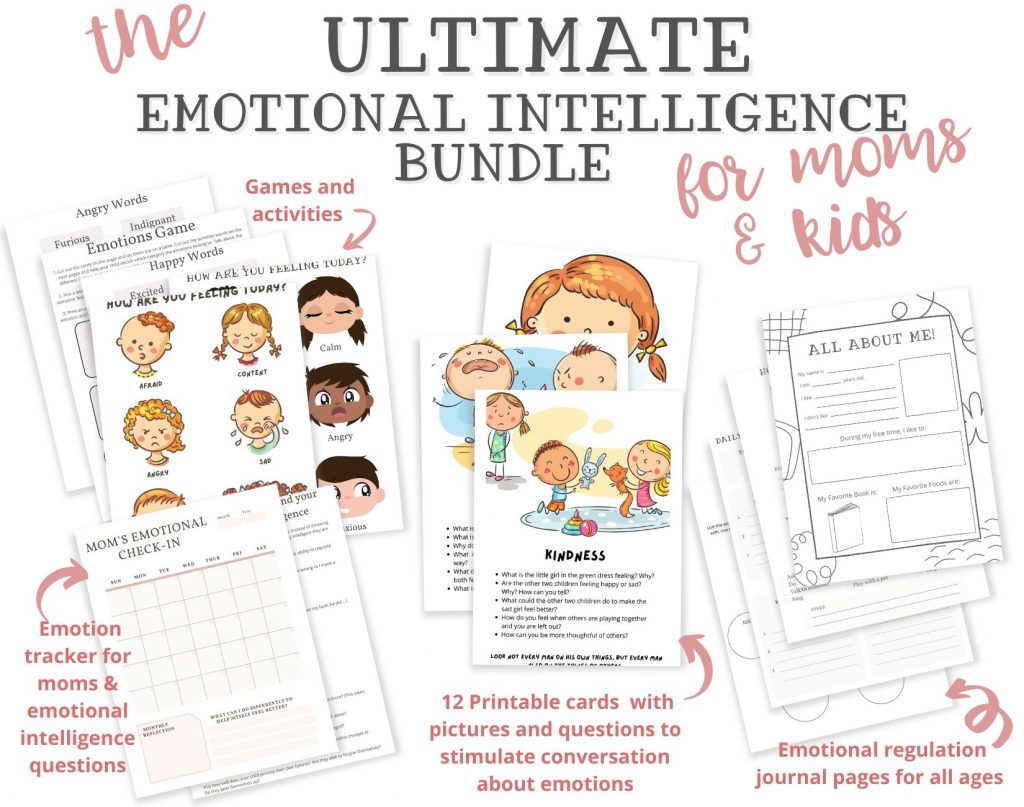How to Teach Kids Emotional Regulation

Is it wrong for Christians to have strong negative emotions?
Because the Bible speaks against anger, hatred and other strong emotions, we often cover them with a veneer of cheerful Christianity while they churn beneath the surface like Mount Etna waiting to erupt.
While I believe throwing tantrums is not a healthy way for a child to express emotion, I don’t believe we should teach them to shut down their emotions and not express them at all. Read about tantrums here)
Shutting down strong emotions may seem like a quick solution, but it’s counterproductive.
What’s wrong with not allowing kids to express emotion?
- It teaches the child that their emotions are not valid and not worthy of expression.
- Because children view life through their emotions, a denial of the emotions denies their very being, who they are.
- Not allowing expression of emotion can lead to the shutting down of all emotion – good and bad. The child may grow to adulthood unable to express how they really feel about anything. This will affect their marriage, working relationships, and every other relational interaction.
- Studies have shown that people who suppress emotions are less able to repair their negative moods in spite of masking their inner feelings. They experienced fewer positive emotions and more negative emotions, had less life satisfaction and less self-esteem.
Suppressing emotions does not remove them, it only inhibits their behavioural expression. The child still experiences the emotions, but it takes continuous effort to control and suppress them and can result in feelings of inauthenticity (not being true to themselves).
Instead of suppressing emotions, children should be encouraged to recognise them, and process them in a healthy way.
Unhealthy expressions of emotion
Before we dive into how to teach emotional regulation, let’s look at some unhealthy expressions of emotion:
- Tantrums
- Prolonged crying
- Sulking
- Silent treatment
- Staying in their room for prolonged periods of time
- Swearing, verbally abusing others, shouting, biting, slamming doors (a child allowed to express anger physically may very well continue to express it that way as an adult)
Related: How to deal with tantrums
Encourage positive expression of negative emotions
Let’s face it, kids face people that bully them, tease them, or treat them unfairly. They face situations that frustrate them, sadden them, and cause them anxiety.
Instead of figuring ways to ignore, or shut down, unpleasant emotions, let’s talk about how we can help kids process their emotions in a healthy, positive way.
We can do this by teaching emotional intelligence.
What is emotional intelligence?
“Emotional intelligence is the capability of individuals to recognize their own emotions and those of others, discern between different feelings and label them appropriately, use emotional information to guide thinking and behaviour, and manage and /or adjust emotions to adapt to environments or achieve one’s goals.” [i]
In plain English, that means perceiving, understanding, and regulating emotions. An emotionally intelligent person is aware of emotions in themselves and others and uses reason to identify, understand, and deal with those emotions effectively.
They recognise their negative emotions but are able to use reason to override them.
Emotionally intelligent people:
- Can identify what they are feeling
- Know how to interpret their emotions
- Understand how their emotions impact others
- Regulate their own emotions
- Manage other people’s emotions
Before you can teach your child emotional intelligence, you must possess it yourself.
Find out how emotionally intelligent your kids are by getting my free list of questions. Just fill in the form below.
How to regulate and process emotions as an adult:
Don’t react right away
Learn to practice the pause when you feel a strong emotion. As Viktor Frankl said, “Between stimulus and response there is a space. In that space is our power to choose our response.”
Pray
In that space between stimulus and response, pray and ask God to help you understand why you are feeling the way you do.
Own the emotion
Recognise the emotion and allow yourself to feel it. Don’t deny it. We often try to suppress emotions through eating, shopping, playing games on our phones, binge-watching Netflix, scrolling mindlessly through Facebook, or looking at porn. But these things don’t remove the emotion, they only suppress it. Owning the emotion means you must enter into it and feel it.
Label and verbally express the emotion
“I am angry. I am hurting. I am frustrated. I am afraid.”
Release the emotion through surrendering it to God
Say, “Lord, I give you my frustration (anger, sadness, hatred). I give you permission to take it from me and replace it with your peace.” It may take some time for the emotion to simmer down. That doesn’t mean your surrender was ineffective. Keep on surrendering it to God.
Reframe your thoughts
Bring your thoughts into captivity to Christ by surrendering them, but then choose to think right thoughts about the situation you are in. This is important because thoughts influence feelings. I tend to slip into excessive guilt when I mess up. I reframe my thoughts by saying to myself, “Yes, I messed up and so-and-so is probably upset with me – and they have a right to be. But I have apologised, and will make it right with them. This is not the end of the world.”
How to help your kids process strong emotions:
Teach about emotions
Teach your child the different emotions and how to recognise them. Use these activities and games to help your child learn about emotions in a fun way.
Acknowledge the emotion
I made the mistake of trying to stop my children’s anger, frustration, or sadness too soon and it didn’t work. The emotion must run a healthy course. Recognise your child’s emotion as real: “I can see you are frustrated with that puzzle. It is hard to figure out where the pieces go.” Acknowledging your child’s emotion validates it and immediately starts the processing of it.
Name the emotion and express it
If your child can’t name what they are feeling then help them. Ask them, “Are you feeling angry? Frustrated? Sad? Unfairly treated?” If your child is too young to express how they feel in words, then try to understand WHY they are acting the way they are. Look at the heart and not just the behaviour and then deal with the root cause.
While it’s not acceptable to hit others, throw a tantrum, swear at people, and bash or break things, it is OK to say, “I am so angry right now.” It’s OK to cry (not uncontrollably or for a prolonged period). The job of a parent is not to get the child to stop crying as quickly as possible. Tears are a healthy expression of emotion. They heal the hurt.
Allow your child to own the feeling
Let them acknowledge how they feel and why they feel that way. Help them by asking why they are feeling angry or frustrated. Get to the root of the issue and deal with that. The strong emotion will dissipate.
Help your child pray and surrender the strong feeling to God
If they are too young to pray for themselves then get them to say the words after you. If they are too young for that then pray on their behalf and surrender your child’s heart to God. Ask for the Holy Spirit to come and calm the storm in your child’s heart.
Related: 8 Parenting Mistakes to Stop Doing Today
Allow a little time for the emotion to simmer down –
it will – like a wave crashing on the beach it will flow up and ebb back again. Hold your child, stroke their head or back, tell them it’s OK. They may need some time alone – in their room, on the couch, or alone outside, but don’t make this a punishment.
Create a calm-down corner where your child can go and sit to regain control. Don’t use this as a punishment. Place drawing or colouring supplies in the corner, some books or toys, and a pillow to hug or squeeze.
Doing something physical – a chore or a bicycle ride or jumping jacks – distracts the mind from the strong emotions and lessens the intensity of the feelings.
Talk about the situation after the emotions have simmered down
You can’t reason with strong feelings, but once the wave has crashed and ebbs back again, follow up and help your child process the situation.
Emotional regulation skills can be learned. As parents, we need to learn and apply them ourselves so that we can help our children process their strong feelings in healthy ways.
How
do you help your children process their emotions? Are you able to process your
own?
[i] Wikipedia.org




Help! My Child has Seen Porn! What do I do Now? - Love More to Live | 13th May 20
[…] Helping your kids deal with strong emotions in a healthy way will help prevent them from looking for an escape in porn. (Read How to Help Kids Process Strong Emotions without Shutting them Down) […]
How to Help Kids Cope with Grief & Loss - Love More to Live | 11th Nov 20
[…] Encourage your child to say what he or she is thinking and feeling in the days, weeks, and months following the loss. Suggest other ways to express feelings such as writing in a journal or drawing a picture. Don’t shut down their feelings or pretend they don’t exist. For more on this read How to Help Kids Process Strong Emotions without Shutting them Down. […]
How to Teach Kids to Apologise Well - Love More to Live | 9th Feb 21
[…] Maybe they were frustrated or angry or scared. Help your child deal with those emotions. Teach them to become emotionally intelligent so they can manage their emotions in a healthy way. (Read here on how to help kids process strong emotions) […]
14 Ways to Overcome Sibling Rivalry - Love More to Live | 3rd Mar 22
[…] Related: How to help kids deal with strong emotions […]
8 Parenting Mistakes to Stop Doing Today - Love More to Live | 22nd Mar 23
[…] Related: How to teach kids to deal with strong emotions […]
How to Deal with Tantrums - Love More to Live | 5th Jun 23
[…] Related: How to Teach Kids Emotional Regulation […]
How to Bond with your Child - Love More to Live | 19th Jun 23
[…] Related: How to teach your child emotional regulation […]
How to Become Self-Aware - Love More to Live | 31st Jul 23
[…] Related: How to teach kids emotional regulation […]